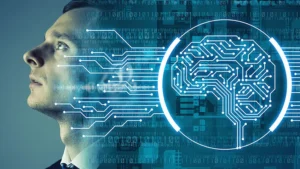Table of Contents
Why in news?
- The world of artificial intelligence (AI) is rapidly evolving, and a new generation of AI systems is emerging – artificial intelligence agents.
- These sophisticated programs are designed to interact with humans in real-time, seamlessly blending text, voice, and even visual inputs to create natural and immersive experiences.
- Unlike their predecessors, chatbots which rely solely on text, AI agents mark a significant leap forward, offering a glimpse into the future of human-computer interaction.
What are Artificial Intelligence Agents?
- Artificial Intelligence agents are essentially intelligent software programs equipped with advanced capabilities.
- They can perceive their surroundings through various sensors, process information using complex algorithms, and respond with intelligent actions.
- This allows them to engage in multi-modal interactions, understanding and responding to human communication through voice, text, and even visual cues.
- Imagine having a conversation with a virtual assistant that not only understands your words but can also interpret your facial expressions or gestures, creating a more dynamic and human-like experience.
Key Differences from Large Language Models (LLMs)
- While large language models (LLMs) like GPT-3 and GPT-4 have garnered significant attention for their text-generation abilities, Artificial Intelligence Agents offer a broader range of functionalities. Here’s a breakdown of the key differences:
- Interaction Type: LLMs are primarily text-based, meaning they receive text input and generate text output. Artificial Intelligence agents, on the other hand, can handle a wider variety of inputs, including voice, images, and even environmental data.
- Real-time Communication: LLMs are often limited to turn-based interactions, where you provide input, wait for a response, and then react. AI agents are designed for real-time conversations, allowing for a more fluid and natural back-and-forth exchange.
- Contextual Awareness: LLMs typically lack the ability to understand the context of a conversation. AI agents, however, can learn and adapt based on the ongoing interaction, providing more relevant and personalized responses.
- Actionable Capabilities: LLMs focus on text generation, limiting their functionality. Artificial Intelligence agents, however, can be programmed to perform complex tasks autonomously, such as coding, data analysis, or even controlling physical systems when integrated with robotics.
The Potential of AI Agents
- The potential applications of AI agents are vast and hold immense promise for various sectors. Here are a few exciting possibilities:
- Intelligent Assistants: Imagine a personal assistant who can not only manage your schedule and appointments but can also understand your preferences and proactively suggest recommendations or complete tasks based on your needs.
- Enhanced Customer Service: Customer service interactions can be revolutionized with AI agents. They can offer seamless, natural conversations, answer questions accurately, and resolve issues efficiently, potentially eliminating the need for human intervention in many cases.
- Personalized Education: AI agents can act as intelligent tutors, tailoring their approach to an individual student’s learning style and pace. They can provide customized instructions, answer questions in real-time, and offer feedback to enhance the learning experience.
- Advanced Healthcare Support: AI agents can assist medical professionals in various ways. They can analyze data in real-time to provide insights and support diagnoses. They can even monitor patients remotely and offer guidance or reminders to help manage chronic conditions
Challenges and Considerations
- While AI agents offer a future filled with exciting possibilities, there are also challenges to consider:
- Privacy and Security: As AI agents gain access to more personal data and environmental information, concerns regarding privacy and security become paramount. Robust security measures and clear ethical guidelines will be crucial for responsible deployment.
- Bias and Fairness: AI agents, like any AI model, can inherit biases from their training data or algorithms. This can lead to discriminatory or unfair outcomes. Mitigating bias through careful data selection and algorithmic design is essential.
- Regulations and Governance: As AI agents become more prevalent, establishing appropriate regulations and governance frameworks will be necessary to ensure their ethical and responsible use.
The Future of AI Interaction
- The emergence of artificial intelligence agents marks a significant shift in the way humans interact with technology.
- By offering a more natural and intuitive way to communicate with machines, artificial intelligence agents have the potential to transform numerous aspects of our lives.
- As these systems continue to evolve, addressing the challenges and ensuring responsible development will be crucial to unlocking the full potential of this groundbreaking technology.
- The future of human-computer interaction is undoubtedly multimodal, and artificial intelligence agents are poised to be at the forefront of this exciting new era.
People also ask
Q1: What are Artificial Intelligence agents?
Ans: Artificial Intelligence agents are intelligent software programs that can interact with humans in real-time using a combination of text, voice, and even visual inputs. Unlike chatbots, which are limited to text, AI agents can understand and respond to natural human communication, creating a more immersive experience.
Q2: How are AI agents different from large language models (LLMs)?
Ans: LLMs, like GPT-3, are primarily focused on text generation. They receive text input and generate text output. AI agents, however, are more versatile. They can handle various inputs (voice, images, etc.) and engage in real-time conversations, adapting their responses based on the context. Additionally, AI agents can be programmed to perform actions, while LLMs are limited to text generation.
Q3: What does the future hold for AI agents?
Ans: Artificial Intelligence agents represent a significant leap forward in human-computer interaction. They offer a more natural way to interact with technology and have the potential to transform various aspects of our lives. As these systems evolve, addressing the challenges and ensuring responsible development will be crucial to unlocking their full potential. The future of human-computer interaction is likely to be multimodal, with AI agents playing a leading role in this exciting new era.

4 thoughts on “Beyond Chatbots: The Rise of Multimodal artificial intelligence Agents”